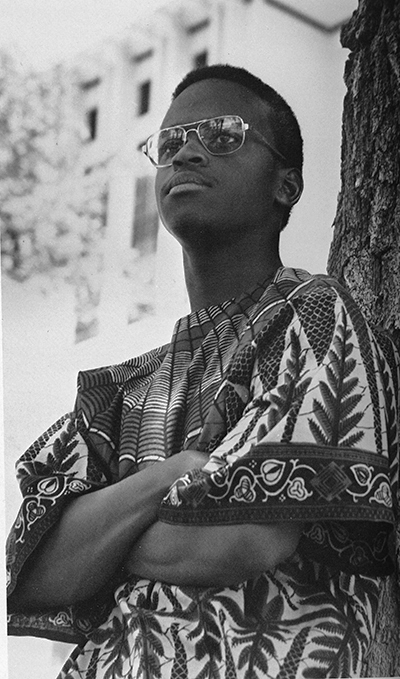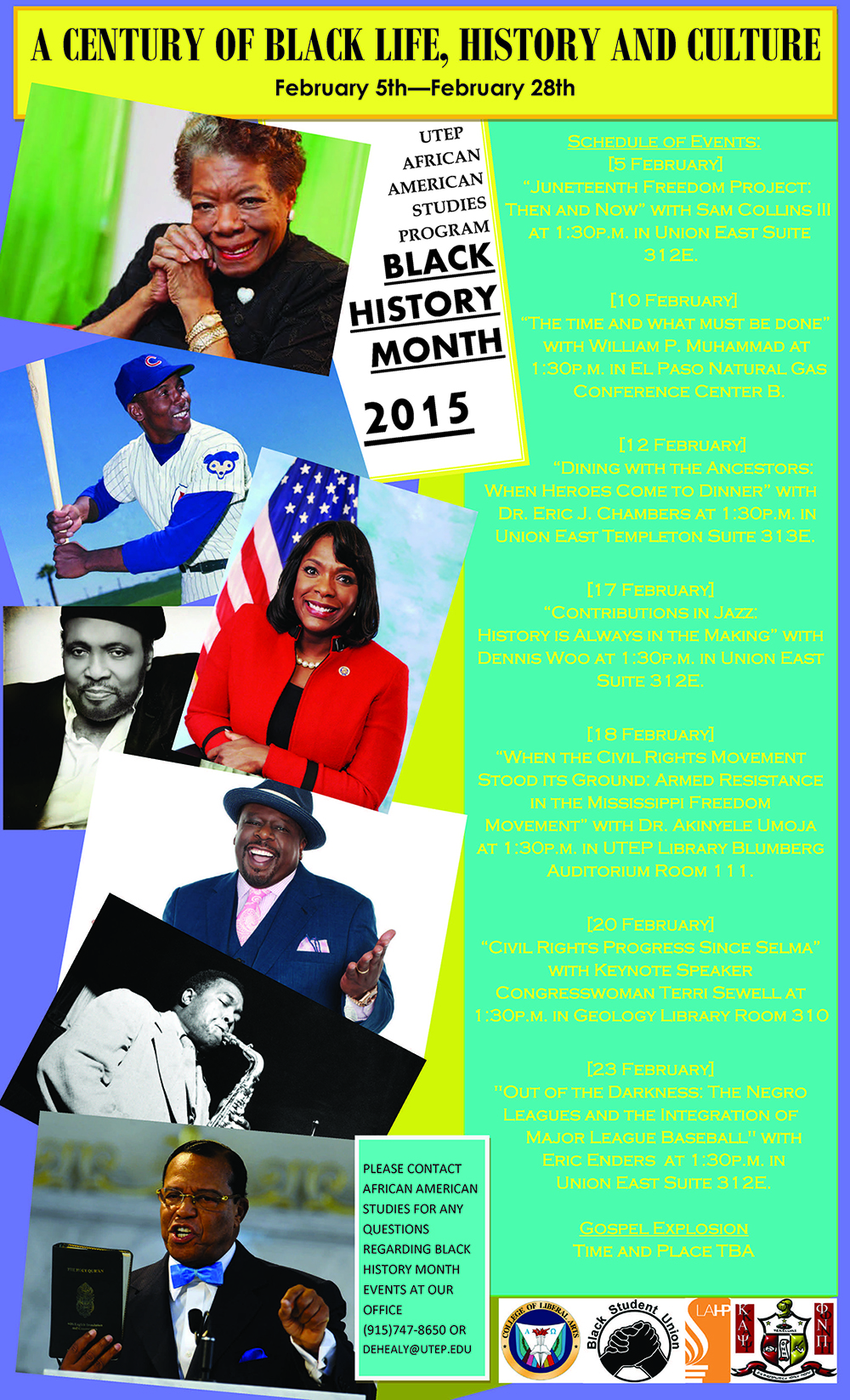Originally published February 6, 2015
By Laura L. Acosta
UTEP News Service
From jazz music to poignant conversations about civil rights, The University of Texas at El Paso will honor Black History Month 2015 with festivities that will pay tribute to the outstanding achievements of African-Americans over the past 100 years.
Organized by UTEP’s African-American Studies Program, the University’s Black History Month celebration features half-a-dozen events from Feb. 5-23 tied to this year’s theme, “A Century of Black Life, History and Culture.” All events are free and open to the community.

“I often argue to my classes that Black History Month is akin to one’s birthday,” said Maceo Crenshaw Dailey Jr., Ph.D., director of UTEP’s African-American Studies Program. “It’s a birthday of a community, and it’s an opportunity to pause and reflect on how far you’ve come and what you have yet to achieve. And it affords the opportunity to invite in family, friends and neighbors and enjoy the celebration.”
Joining the celebration will be UTEP alumnus William Muhammad, a Nation of Islam minister and writer, who will discuss, “The Time and What Must be Done,” at 1:30 p.m. Tuesday, Feb. 10 in the El Paso Natural Gas Conference Center. Dennis Woo, operations director for KTEP-FM (88.5) will talk about the contributions in jazz at 1:30 p.m., Tuesday, Feb. 17, in Union Building East, suite 312E.
On Feb. 20, Alabama Congresswoman Terri Sewell will deliver the keynote address at 1:30 p.m. in the Geology Reading Room, on the third floor of the Geological Sciences Building. Sewell is the first African-American woman elected to Congress from Alabama. She will talk about “Civil Rights Progress Since Selma,” followed by a Q-and-A with UTEP students.
“We’re very proud to have so many progressive people involved in our celebration by participating with us in recognizing the remarkable accomplishments of African-Americans, but yet recognizing that there are some major issues that we still must confront,” Dailey added.
The roots of Black History Month can be traced to 1915 when noted historian Carter G. Woodson and the prominent minister Jesse E. Moorland founded the Association for the Study of Negro Life and History (ASNLH) to raise awareness of African-Americans’ contributions in U.S. history.
Now known as the as the Association for the Study of African-American Life and History (ASALH), the group sponsored the first “Negro History Week” in 1926 during the second week in February to coincide with the birthdays of Abraham Lincoln and Frederick Douglass.
The week evolved into a monthlong celebration, and since 1976, every U.S. president has officially designated the month of February as Black History Month.
The celebration is an opportunity for UTEP to showcase African-American history and culture and also reflect on the University’s pivotal role in the civil rights movement.
In 1955, Thelma White, valedictorian of Douglass High School in El Paso, filed suit in federal district court when she was denied admission to Texas Western College (now UTEP) because she was black.
Ten days before her case was to go to court, Texas Western College (TWC) became the first desegregated undergraduate institution in Texas.
White enrolled at New Mexico A&M College in Las Cruces (now New Mexico State University), but as a result of her actions, Joe Atkins, Bernice Bell, Mabel Butler, Sandra Campbell, John English, Marcellus Fullmore, Silverlene Hamilton, Margaret Jackson, Leonard McNeece, William Miner, Clarence Stevens and Mildred Parrish Tutt (Massey) became the first African-American students admitted to TWC in fall 1955.
Former El Paso Mayor Don Henderson, who was president of the TWC student body the time, recalled getting phone calls from reporters across the country wanting to know if riots were going to break out when the new students stepped onto campus.
“I told them there wouldn’t be any (problems),” Henderson said during an interview with UTEP’s Institute of Oral History. “We didn’t care what color they were. We didn’t care where they came from. We opened the door for them to enjoy what we enjoy and to have the opportunity to get an education.”
TWC made history again in 1966 when Coach Don Haskins started an all-African-American lineup against an all-white Kentucky squad in the NCAA national championship basketball game. The journey to the championship and TWC’s defeat of Kentucky 72-65 was the focus of the 2006 Disney film Glory Road.
UTEP alumnus Donald Williams, a prominent attorney and community leader, has left his own historical mark on the University. In 1972, Williams earned the distinction of becoming the University’s first African-American Student Government Association President. He was also the first African-American student body president in The University of Texas System.
Williams attributed his victory with his involvement in several different organizations on campus, including ROTC, the Baptist Student Union, the Black Student Union and the Alpha Phi Alpha Fraternity, which put him in contact with diverse groups of students who voted for him.
“We had athletes who were winning,” recalled Williams, who graduated from UTEP in 1973. “I was the student body president. ‘Dante the Jazzman’ had a radio program. One member (in the dorm) was the president of the Black Student Union. So all of these guys were leaders in different areas, and again that’s what helped me win.”
Williams credits UTEP with helping him achieve success in his career and personal life. Among his many accolades, Williams went on to become El Paso’s first African-American judge. He graduated from The University of Texas at Austin School of Law in 1975.
He has been married for 43 years to Ruth Ybarra Williams, a UTEP graduate whom Williams met during his presidency. Two of their three children also are UTEP graduates.
Williams has given back to UTEP through the Donald L. Williams Endowed Student Enhancement Fund and is actively involved in the University through the former Thelma White Network, which led to the establishment of the African-American Studies program.
“The same things that existed for me as a black student in those days still exist,” Williams said. “It’s not overt, but a lot of times people just look at you to determine who you are and what you can do. And my goal is to be available for the students for them to see that if these people could do it back in the ’60s and ’70s, we can do better now.”
For more information about UTEP’s Black History Month celebration and events, contact the African-American Studies Program office at 915-747-8650 or visit the program’s website here.
